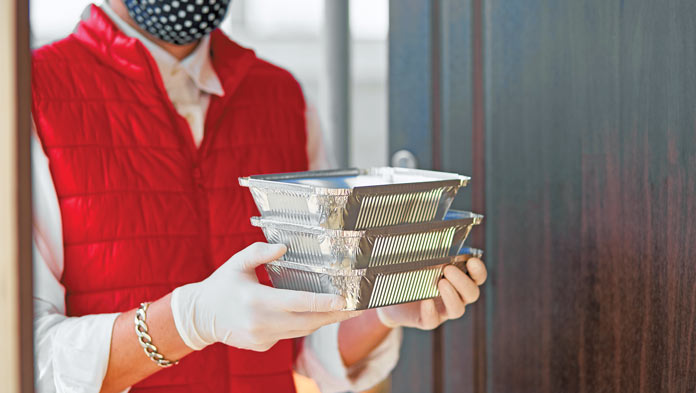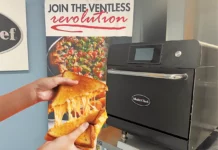
Article contributed by Ilan Weiser, Ellenoff Grossman & Schole LLP
More consumers have turned to food delivery as an alternative to traditional in-person dining due to the restrictions placed on the public and restaurants as a result of the COVID-19 pandemic. Some restaurants who previously did not offer food delivery are now doing so through third parties such as DoorDash or Relay. Other restaurants who may have been forced to lay off staff have also turned to similar third parties to satisfy their delivery needs. Restaurants should consider the advantages, from a legal liability-standpoint, of using gig workers provided by those third parties to deliver food, instead of directly employing their own delivery workers.
Most restaurants that directly employ delivery workers utilize the tip credit and pay an hourly rate that is below the minimum wage. The difference between that sub-minimum and the minimum wage is made up for by tips paid to delivery workers by the restaurant’s customers. This pay arrangement may be lawful assuming the delivery workers earn a sufficient amount in tips per hour to cover the difference. Unfortunately, the restaurant’s risk of related legal liability does not end with that basic requirement. Restaurants that directly employ delivery workers, particularly those in New York, still face the very high likelihood that they will be sued for two other reasons: (1) improper notice of the tip credit; and/or (2) violation of the so-called “80/20 rule.”
Both federal and New York law require that a restaurant give notice to its delivery workers if it intends to take a tip credit and pay the sub-minimum wage. New York law mandates that the restaurant give notice of the tip credit in writing. Sounds easy enough…right? Wrong.
Those written notice requirements under New York law are hyper-technical and extremely difficult to comply with. Written notice is arguably non-complaint if, for example, the restaurant lists the delivery worker’s rate of pay as the sub-minimum wage, instead of the minimum wage. This requirement gets restaurants into hot water as even the most experienced legal counsel, PEOs and payroll companies frequently mislead their restaurant clients on how to properly give delivery workers notice of the tip credit that is legally compliant. The resulting liability can be nothing short of disastrous, as failure to provide a delivery worker with proper notice may result in the restaurant owing the delivery worker the difference between the sub-minimum wage and the standard minimum wage, for each and every hour they worked. In New York that could translate to six years’ worth of back wages owed.
Another reason a restaurant may think twice about continuing to directly employ delivery workers is the high likelihood they will be sued for violation of the “80/20 rule.” In New York, on any day that a delivery worker performs non-tipped duties, e.g. rolling silverware, for two hours or more, or for more than 20 percent of their shift, whichever is less, the restaurant cannot apply any tip credit to the delivery worker’s wages for that day. Certain New York restaurants may think they are safe from this law if they never make their delivery workers perform work outside of delivering food. Unfortunately, the sad reality is that many wage/hour lawsuits filed against New York restaurants by its delivery workers allege violation of the 80/20 rule regardless of the time spent performing non-tipped work, if any was even performed at all.
The difficulty and high cost of defending against the above two claims is a main reason why many restaurants have decided to stop directly employing delivery workers and instead utilize the delivery services provided by third parties. If a restaurant decides to go that route, it should implement easy additional safeguards to prevent other related legal exposure. For example, the third party’s delivery worker may try to hold the restaurant legally responsible for wage/hour violations, in addition to the third party provider that actually engages or employs them, under a joint employer theory. To avoid that, the restaurant should, at the very least, ensure that its agreements with the third-party delivery service have indemnification provisions so that the restaurant’s legal fees are covered should they be wrongly named in a lawsuit. In addition, the restaurant should train its staff to treat third party delivery workers as non-employees. Many third party delivery workers may have worked for the restaurant in the past and have personal relationships with the employees still working there. As a result, those delivery workers may feel comfortable going behind the counter, as an employee would, to retrieve a delivery, socialize with old friends, or utilize the restaurant’s facilities or equipment.
The United States Department of Labor announced recently that restaurants may apply a tip credit irrespective of time that a tipped worker performs non-tipped work so long as the work is performed “contemporaneously with” the employee’s tipped duties, “or for a reasonable time immediately before or after performing the tipped duties.” This final rule will effectively limit a restaurant’s liability under the federal 80/20 rule. New York restaurants should hope their state legislators implement similar changes to New York’s draconian rules, which were putting local restaurants out of business for these unintentional technical violations, or baseless allegations, well before the pandemic.
 Ilan Weiser is a Partner in the Labor & Employment practice group at Ellenoff Grossman & Schole LLP in New York City. Mr. Weiser exclusively represents businesses of all sizes and sectors on how best to comply with the federal, state and local labor laws that govern their operations. Mr. Weiser’s principal area of expertise is employment law litigation and has vigorously defended hundreds of his clients in federal and state court and before various governmental agencies against claims of employment discrimination and unfair pay practices. Mr. Weiser has particularly in-depth knowledge of wage and hour law and regularly defends and counsels his clients in class and collective lawsuits concerning claims for unpaid wages. Ilan Weiser can be reached at iweiser@egsllp.com or via phone at 212-370-1300.
Ilan Weiser is a Partner in the Labor & Employment practice group at Ellenoff Grossman & Schole LLP in New York City. Mr. Weiser exclusively represents businesses of all sizes and sectors on how best to comply with the federal, state and local labor laws that govern their operations. Mr. Weiser’s principal area of expertise is employment law litigation and has vigorously defended hundreds of his clients in federal and state court and before various governmental agencies against claims of employment discrimination and unfair pay practices. Mr. Weiser has particularly in-depth knowledge of wage and hour law and regularly defends and counsels his clients in class and collective lawsuits concerning claims for unpaid wages. Ilan Weiser can be reached at iweiser@egsllp.com or via phone at 212-370-1300.























